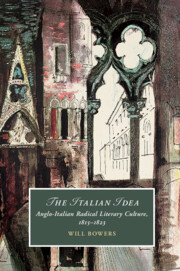‘As an ambitious and challenging reflection on the wider implications of the Anglo-Italian cultural interaction in the early nineteenth century, The Italian Idea makes a significant contribution to the field of Anglo-Italian studies and literary history. It exemplifies a new kind of intellectual and political awareness - more trans-European and less national - of the radical writers of the time. But the real strength of this study lies in the range of Bowers' erudition.’
Maria Schoina
Source: Review 19
‘The volume is clearly structured, each chapter is introduced by a short introductory overview and written in a captivating style … The conclusion leaves the reader feeling that the author could provide a continuation to this impressive and learned study …’
Antonella Braida
Source: The Review of English Studies
‘A hugely significant contribution to scholarship in this area, The Italian Idea sketches a variegated map, valuable both for the broader directions of travel it indicates and for the insights into seemingly accessory features … A rewardingly rich and continuously stimulating read, Bowers’s The Italian Idea invites us to plunge into a short and fervid cultural-ideological phase in order to recover the full extent of one of the most distinctive facets of Italia romantica in British culture of the Romantic age.’
Diego Saglia
Source: Modern Philology
‘This meticulous survey carefully contextualizes second-generation British Romantic writers' texts … proving that a study of Anglo-Italian cross-currents provides additional insights … One of this study's great strengths is the wealth of diverse material Bowers welds together, combining reflections on authors' influence; rhyme schemes; sub-genres such as romance, the satirical mode, history, translation; mediator figures; and even advertising (in Beppo) to add new angles of analysis.’
Susanne Schmid
Source: The BARS Review
‘Rather than a hot-chronology, or a snapshot, Bowers offers the reader what I like to think of as an impressive diorama of English and Italian engagement. The pieces move in unanticipated and previously unapprehended ways, there are hidden corners and strange shadows, and we know that it is selective, but that is why it works. It is a rare thing to discover such a learned and gracefully written book as this.’
Bysshe Inigo Coffey
Source: The Wordsworth Circle
'The Italian Idea offers a fine contribution to the strong and durable critical interest in Anglo-Italian relations during the period. Particularly effective is Bowers's telescoping mode of inquiry, one that allows him to move nimbly between insightful close readings of individual works and a contextual regard for the complex ways that these works are warmed by the fading revolutionary coals of the post-Waterloo years.'
John Bugg
Source: Keats-Shelley Journal



